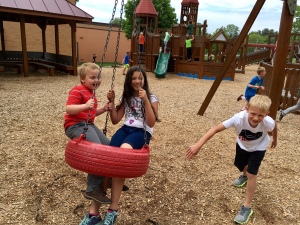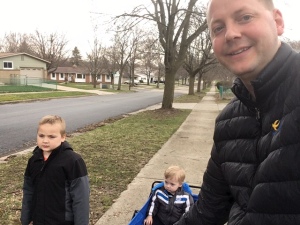By Tim & Laura Paauw
June 14, 2017

This past week we have had a couple of scenes play out in our life with Nolan that I believe many with a “diversability” (diversability = experiences the world in a different manner than most people) have regularly. Allow us to paint the two scenes and our feelings that happened behind the scenes, after them we’ll provide a few helpful hints on how we’d play these scenes out differently in our “dream world”…
Scene one: Walking Around Our Block (Tim Paauw)
Last week I took my sons on a walk around our neighborhood block. It is a short distance, but a great chance to get fresh air and be together. The scene was a perfect Michigan early summer day, 75 degrees and sunny.
Neither of my boys can talk… yet. We walk in silence or I do most of the talking, but as we walk we exchange smiles and soak up the beauty all around us. These walking moments are some of the most peace-filled moments in my life and I look forward to the bonding with my boys.

On this particular day, we walked past a dad throwing a ball with his young son in their front yard. The dad was very excited to see Nolan and asked me, “How old is your son?”
“He is six years old turning seven this month,” I responded.
“Oh! My son is the same age. Would your boy like to join mine for some catch?”
“He can’t. He is autistic and hasn’t learned that skill yet,” I let him know (hoping my son wasn’t able to comprehend this comment and interpret it from his own dad as an insult).
“Okay, well I hope you guys enjoy your walk!” said the nice man.
As I walked away I fought back tears. Not because I need a baseball playing son. Not because I’d rather be doing something else besides our silent walk. Because I felt like I had somehow let Nolan down. When I stated it out loud in this context in front of him it felt like I was somehow implying my son was “worth less” than another six year old. I leaned over to him and gave him a kiss on his forehead as we walked away. I whispered, “Nolan, you are my boy and there is nothing I look forward to in my week than walking around this block with you.”
Scene Two: Visiting the Splash Pad (Laura Paauw)
“Is he yours? What’s wrong? Is he handicapped?” These were the questions that were directed at me this week while I had my three kids at a splash pad. I really just wanted a day to play in the water. I was really excited that I had all of them interested in the same activity at the same time…and nobody was running away or throwing a tantrum. I didn’t want to explain autism, be an educator, or be Nolan’s advocate while at the splash pad. I just wanted to be a normal mom for once.
These questions weren’t asked by a child; they came from a grandma. I understand that adults and kids are curious when they see someone who is different than they are. I wish people would look for the similarities instead of the differences (“Wow! That boy looks like he really loves water and is having a great time! You guys both enjoy the same thing!”) I already know that Nolan stands out in a crowd. Help him blend in by seeing what a cool kid he is instead of pointing out his deficits.
Our Dream World: The Power of “I noticed” …
“I noticed” that when a statement starts with that phrase it can impact how people will feel when they hear what you are going to say. We all want to be noticed at some level in life. When that comes across in a positive situation it can extend well beyond that moment. On the other hand, when we make a comment that implies we only noticed a negative attribute of someone it can also extend well beyond the moment.
When using a “I noticed” sentence it comes across more as an observable fact about someone. It reveals a layer of your thinking that can open up conversation (open dialogue for understanding) or a discussion (two sides aiming more at persuading each other). I believe conversations are the right avenue for learning and building awareness of someone’s diversability.
In scene one above, as a dad I cannot tell you how impressed I was that a neighbor “noticed” Nolan and invited him to join the game they were playing. This was SO heartwarming. I LOVE that the dad took a chance and initiated conversation. This is part of a dream world.
What I wish could have happened (on my end or the other dad’s end) is that we would have established something the six year old boys COULD DO together. We have a trampoline and swingset in our yard… had I been quicker on my feet I should have responded, “I notice that your boy loves being outside as much as mine. We’d love to have you guys over so they could jump on the trampoline together sometime!”
We missed an opportunity to turn an awkward interaction into an inclusive one. Had “I noticed” more quickly we could have come up with a common bond that would help two boys form a basic friendship. I regret missing that moment.
In scene two… imagine if the grandma had said to Laura, “I noticed that your son REALLY loves water! His smile makes the splash pad a more enjoyable place to be. What else does he like to do?”
That would have opened a door for a conversation rather than sentences that came across with tension that took away from a mom just wanting a normal day at the splash pad with her kids.
We are a couple who aims to be very transparent about Nolan’s challenges and diversabilities. We advocate for people to ask questions to understand. It helps us know people care. This week, we learned that the framing and sometimes context of those questions can make a big impact as well.
So, if you are reading scene one and scene two and trying to sort through… “What went wrong? or “What would I do?” Here are my reflective suggestions:
- Be curious. Noticing someone’s diversability is okay. They likely don’t want to be invisible or viewed as “less”
- Figure out a way to take what you noticed and frame it into an encouraging observation and transform it into a way to relate / connect (example: “I couldn’t help but notice that your child loves shapes. My child loves the sandbox. Would your child like to draw shapes with mine in the sandbox?”)
- Remember the old adage, “If you don’t have something nice to say, don’t…” This rings true with people that have diversabilities. If you see someone in a wheelchair don’t say, “I feel bad that you can’t join us in the game.”


this is an awesome blog you guys. What a wonderful way to help us all understand how we can be a positive light rather than a negative one. I learn so much from you and how you have handled situations. I also so appreciate your honesty when times are challenging and out right stink! God placed Nolanin your care because He knew what a wonderful life you would give him! You got this and are doing amazing already. Thank you!!!!
LikeLike